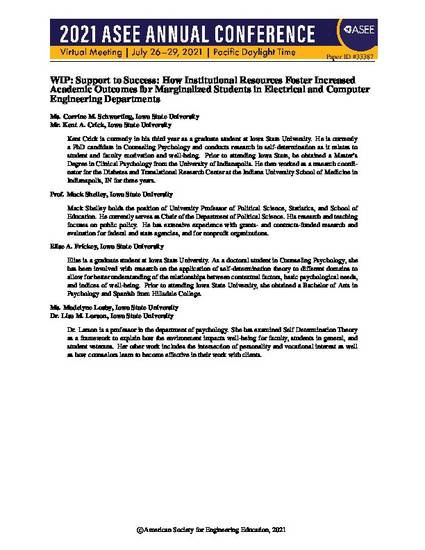
Existing literature well documents that women and students of color are underrepresented across STEM (science, technology, engineering, and mathematics) field majors and industry positions. Women comprise 47% of the workforce yet hold only 12% of engineering jobs [1]. Additionally, citizens who identify as Latino/a, Black, Native American, or Alaska Native together make up 27% of the U.S. population age 21 and older but hold only 11% of science and engineering positions [2].
Relative to other fields of engineering, electrical and computer engineering lag behind with women making up 19% and 18% of undergraduate degrees awarded, respectively. Underrepresentation of women in engineering majors and subsequent industry positions begins with an individual’s choice to pursue this career field [3]. Difficulties in recruiting and retaining female-identified engineering students have been explained by availability, or absence, of environmental supports such as assistance in male-dominated teams [4] and positive relationships with advisors and mentors [5]. Conversely, negative gender stereotypes of women’s engineering abilities deter women from entering or finishing an engineering major. For example, male-identified engineering students, when compared to their female-identified counterparts, endorsed more gender stereotypes about women, which may contribute to an unwelcoming environment [6]. Additionally, women in engineering have reported strained relationships with their male-identified classmates [7], which has been cited as a common barrier in pursuing engineering and STEM occupations post-graduation [8-9]. Students who do not feel welcomed nor identify as someone in that major may pursue an alternative career path.
Available at: http://works.bepress.com/lisa_larson/20/

Schwarting, C.M., Crick, K.A., Shelley, M., Frickey, E.A., Losby, M., Larson, L.M., Support to Success: How Institutional Resources Foster Increased Academic Outcomes for Marginalized Students in Electrical and Computer Engineering Departments presented at 2021 ASEE Virtual Annual Conference. July 26yh-29th 2021. Virtual conference. https://peer.asee.org/38100 Posted with permission.